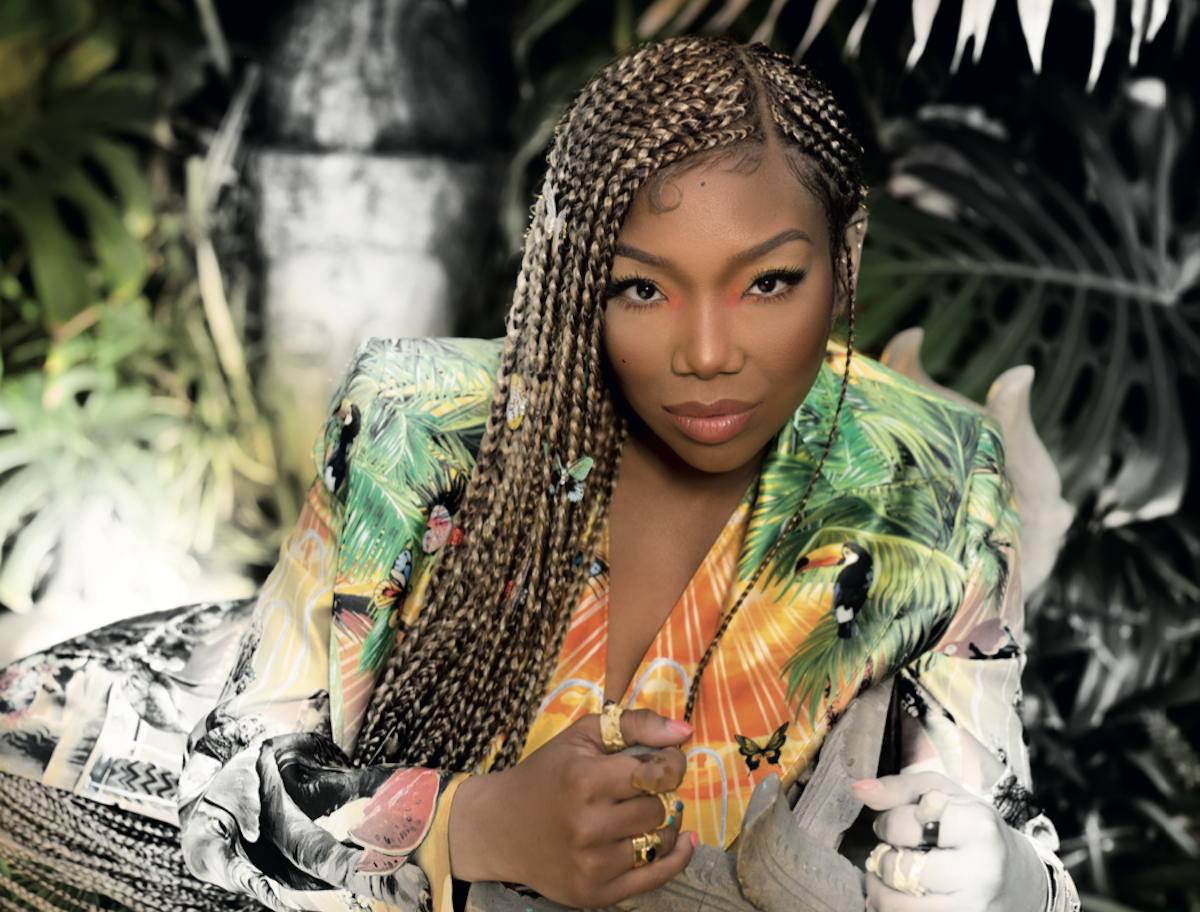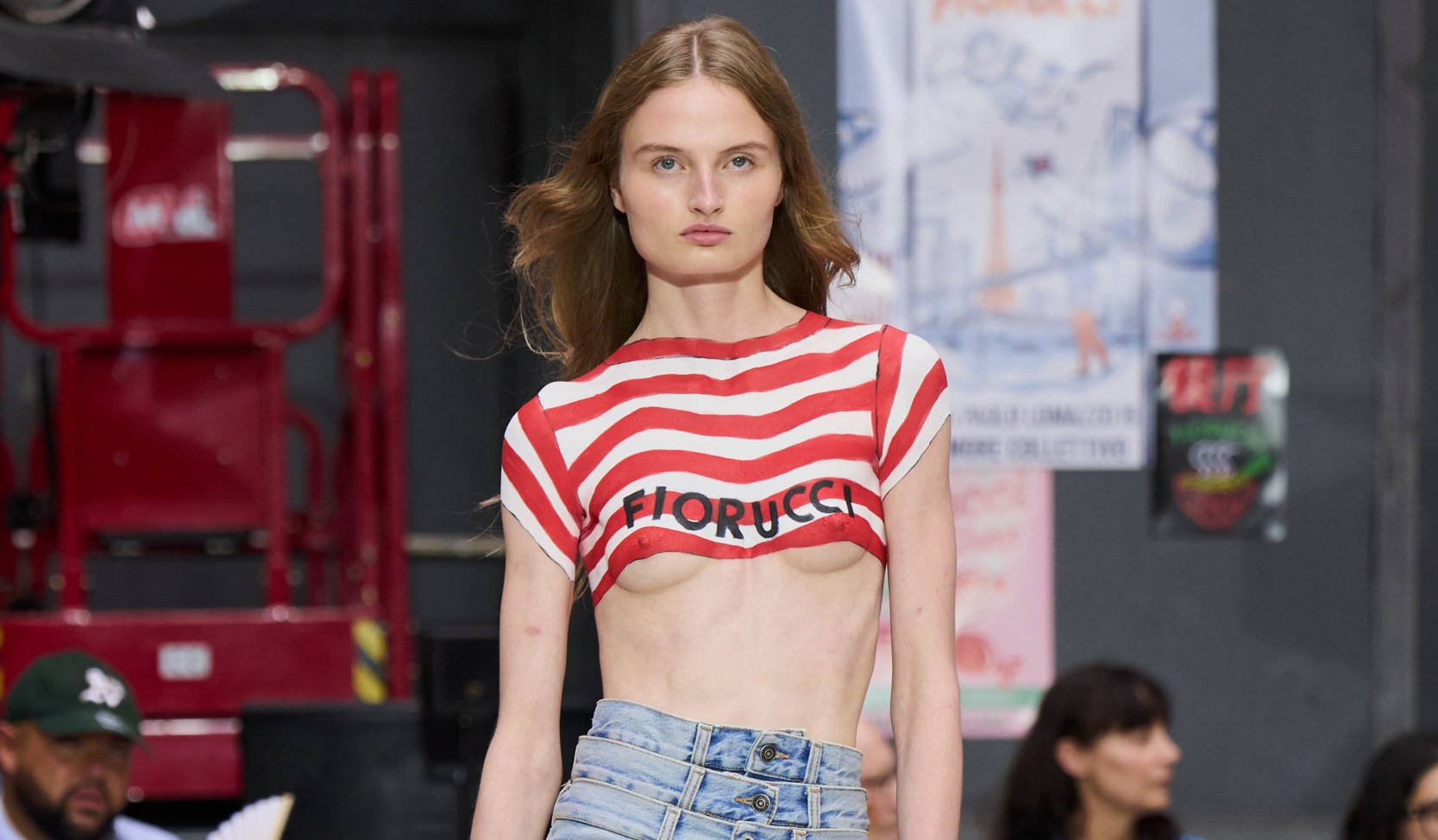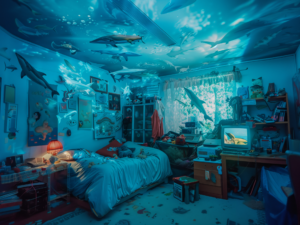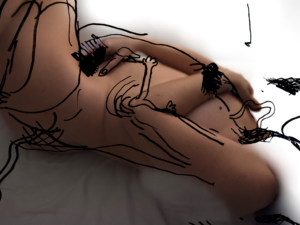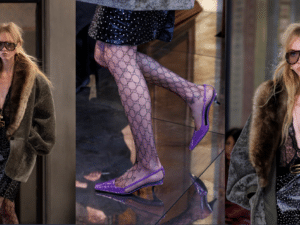Fräulein: Hi, Brandy. I really need to start with this question: Is it true that you heard I Wanna Be Down playing for the first time on the radio at Taco Bell?
Brandy: Yes! [laughs] It was actually Del Taco in Charleston. I was so excited to share my song in my neighborhood at one of my favorite fast food places, coming from another person’s car – that was just unbelievable. It was like everybody’s experience, it was very surreal. And then, another time, I heard it in another one of my favorite fast food places in my neighborhood. It was after church when someone pulled up, playing the song. It was not coming from the radio, but from a casette. I could tell because when they ordered their food and then got back in the car, the song started from where it had stopped, so I knew it was a person that really bought that song. I was just amazed, so blown away by that experience, it is a memory that I’ll never forget.
So beautiful. How are you today and how are you handling these intense and difficult times of the pandemic?
Oh my god, it’s been just a different way to live life, to respond to life. It’s another way to separate us all and that’s not a great feeling. But in a positive way, me and my family are a lot closer together, just not taking things for granted and appreciating the smallest things, and trying to stay as safe and as positive as possible. And my heart goes out to everyone who has suffered from this, whose life has completely changed, not for the better.
Has the pandemic been a life lesson?
Yes. It’s a time of self-reflection. I find myself thinking about things I haven’t thought about in a long time because of the isolation. In your mind, it’s pretty still, you start to think about things that matter the most, you become aware of things that have just happened and accountable for things that you’ve done. I really wanted to reach out to people and see how people are, people who I haven’t spoken to in a long time. Change comes with pros and cons. I definitely see the good in this, but also the tragedy.
You were brought up with a religious Christian belief. How important is religion to you today, did it become more relevant in the past weeks and months?
I think spirituality is life. I feel like spirituality is music, spirituality is love, and I definitely know for a fact there is a higher intelligence, there is unconditional love in this universe that is ready and available for us all to embrace, to strive for creating the kind of behavior that will present love in the highest way. Believing in that and having a certainty in that keeps me on track and it keeps me inspired to be the best version of me that I can be. Although I’m not perfect in my behavior, there is a nature within all of us that I completely respect and honor. I’m thankful that I have that foundation because I don’t know what I would do without it.
Does that foundation help you to practice self-love?
Absolutely. Because I think self-love is when you find a true love and a true bond with the highest; I do really believe that. It starts with yourself and the love that you have for yourself. So you can nurture that love and be a vessel to share with others.
What do you think of concepts as Kanye West’s Sunday Service?
I think that any idea that is celebrating love and music and art in a way to heal and touch people is a blessing. And when it’s not self-serving, it’s more about unity and togetherness – I think that’s beautiful. So, I support anyone who is moving spirit and culture in that way, through love and positivity. That’s for anyone that’s on that wave.
As a teenager but also later on, you went through a lot of emotionally difficult years. Is music therapeutic to you?
Oh, music is the best therapy. [laughs] Just to be able to express my feelings through harmonies, certain lyrics, language – creating all of that with sound is a different kind of healing, more than anything. And I’m blessed to be able to connect with music on such an emotional and personal level and to be able to be very sensitive to it is truly a blessing. It’s a craft and a skill that you try to hold and master so you can be proud of the work that you put out there.
How did you deal with your early success? At age 15, you had already built an impactful career. Did you ever feel like somebody stole your youth?
No, I definitely feel like I had a very different childhood than the norm, but these were my dreams that I couldn’t see any other way at that time for me to live my life. My entire childhood, I was going after having a singing career. I could always see myself on stage, with a band, dancing and singing. That was all I could really see, so it was only natural for it to happen to me. Of course, I could have had a completely different childhood if I didn’t grow up in the public eye. My life would have been very different, but at the same time, my dreams wouldn’t have been a reality for me. So, I just had to figure out a way to balance my life.
I was growing up in front of the world and grew up in different personas with having my own television show and this perfect image – that of course had its own struggles and its own darkness. But I was able to do it because I had a solid foundation and my family, and was able to find the truth within myself as I grew older. And, of course, being a mom at such a young age also has saved me in a lot of ways. As much as what I’ve been through, I wouldn’t change it. I’ve been so blessed. On the one side, I go through a lot of ups and downs, but on the other side, I’m blessed to be whatever I can imagine because my dreams are my reality.
Throughout your career, you have been managed by your mother. How do you feel about that today, looking back?
Well, honestly, just being a mother and a daughter comes with its own challenges. Just normal mom and daughter with their bond, dealing with the pressure of having the whole relationship with management in a business where it’s really tough. We went through so much, but I just developed a huge respect for my mom as I got older because it’s such a hard thing to do [to be a manager].
Basically, she protected me from the vultures that come in this industry, from the people that are not so nice. But then, also, she was part of my dreams and helped them become a reality. She was there with me for everything I went through in my life, and she has never left my side. Even when she wasn’t my manager, she has always been my mother and I appreciate her so much. I’ve never really won at the level that I’ve been able to win with anybody like I have with my mum. It’s just great that I have created so many historical moments with her as a manager and to make her proud as a daughter. And then, for her, to be such an example for me as a mother.
I think a part of the reason why I’m so strong is because I had a strong mother as an example to look up to and to imitate. And I’m a better person because she is my mother and she’s a part of my life. I’m very thankful for her, she has helped me tremendously, also in being a part of a village to help me raise my own daughter.
Would you manage your own daughter as well?
No, never, I would never manage my daughter’s career. It’s a whole other thing. No way! [laughs]
You also collaborated with her for the first time for your new album…
Yes, we are both singers and have that kind of bond, we of course wanted to do something together. We both love our song High Heels. It’s a song about self-worth and personal values and about finding good truth about you, that you’re not shallow. It shows that our love is deep, we have a beautiful relationship. It is so great to share music with her, she loves it as much as I do.
Your new song Baby Mama is an homage to mothers and babyhood. How did your daughter change your personal perspective on life?
Oh my god – just to meet her, to bond with her, to look into her eyes. When I first saw her, that was a feeling that I can’t really put into words. It’s beyond unconditional love and I immediately felt a deeper connection with God through my relationship with her. I really felt more reasons to be alive and more reasons to live my life with purpose. I just can’t imagine my life without my daughter in it. To be able to put out a song that was inspired by her and motherhood in general and trying to change the negative narrative that comes with the word baby mama is a powerful position, to be an example, to be alive in your child’s life, to be your child’s inspiration.
I wanted to pay homage to everyone, especially to single moms who have it a little bit harder than others and to just give a voice to women who strive to be the best that they can be for their babies. And then to collaborate with Chance, who is such a great artist and delivered a profound work in this collaboration with me, was awesome. It’s just good to be back and it is very meaningful to basically reintroduce myself to music.
B7 is also your first album as an independent artist. How did you experience the difference?
I love collaborating and I love working with people that believe and support in a lot of different creative ways. But to be independent and to be in a position where I can create that kind of music that’s true to me is huge. But again, I appreciate both sides, including my experiences with different labels, everything is a learning experience. I think I wouldn’t want to change the way my path has been laid out for me because I’ve learned so much. I’m in a position now where I can look back and be very appreciative for everything that I’ve experienced, but also celebrate the fact that my freedom is ringing, that I can do whatever feels creatively best for me to do. That is a beautiful place to be.
Did you feel a certain pressure to reinvent yourself?
I think with time you evolve and you grow and you change naturally. The sound changes, so does the way you see yourself. Sometimes you have a pressure of people not wanting you to grow, people not wanting you to change, people wanting you to pretty much stay the same, or be the way they expect you to be. Sometimes that can weigh on an artist because our job is to lead and at the same time to relate. That’s why you want people to grow with you, you want people to respect what you’ve become. It turns into your art and, often, that can be challenging. In my growth I was able to not allow that to control me or affect me in a way where I didn’t do what I thought was best. I think that you’ll get more confident in yourself in time. Now, I can stick to my gut and follow my heart when it comes to my music and not allow pressure to dictate and to define who I am or who I’m supposed to be.
Is it more difficult for female artists to grow and get older and still pursue a successful career?
I think it’s actually a perception of what your realities are, but I think in general, being an artist is about being open to the creative power that is flowing in you, that is always ready and willing to express itself. It is always about how open and how humble you are to be used by that magical power that uses art to touch, relate and heal.
For your new music video, Baby Mama, what was important to you in terms of aesthetics and styling? How did you want people to perceive you?
I know for a fact that I am a role model and I wanted to represent myself in that way. I have a 17-year-old daughter that is looking up to me to be graceful and poised and classy. So, I wanted to represent that in the way I look, in the way I carried myself in that video. And then I also wanted to celebrate women: The younger women that you see in the video represent the daughters that the mothers strive to protect. It’s also a video that pays homage to Samy Davis Jr.’s The Rhythm of Life. If you go back into his catalogue, you see that the video is so similar, but we put our own twist to it. And I also wanted to celebrate dance as well. Dance is a way to celebrate freedom, youth and strength. Just moving around makes you feel better. When you watch the video, you’ll see a glow, you’ll see a happiness about it, but you’ll also see class, and you’ll also see just a great representation of baby mamas, mothers and women in general.
Do you think that it’s the right time for female artists to make statements against the oversexualized image the music industry suggests?
For me, that has never worked. To be oversexual has never been for me. I’ve been able to reconnect with that part of myself where I don’t feel like I have to go that route to connect. I love the way I look in the new video, that I have all of my clothes on. What I represent works for me but of course other arists have their own way to express themselves and I don’t judge anybody for what they do. I just know what works for me. And I feel comfortable staying true to that because when I wasn’t true to that, I didn’t feel comfortable with myself.
You have both collaborated with and been highly influenced by Whitney Houston. If she were still alive today, what would you tell her or what would you ask her?
That’s a very hard question to answer. I was very affected by her passing. She actually passed on my birthday, so that day will never be the same. Just her entire life [long pause] was such an inspiration for me, coming up and then getting to know her and work with her, and then to watch what she had to endure was very tough. I know that I would tell her how much I love her and how much she’s loved. I know that she is an angel now and her spirit lives on through her music. I’m thankful for her presence and her gift. I’ll never forget my moments with her. But I have no idea what I would ask her or say to her other than: I love you so much. It was really important for me to let her know what she meant to me before she left this planet.
In my youth, I was so moved by your cover version of Phil Collins’ Another Day in Paradise. How do you feel looking back at this story and this song today, especially in these times?
Thank you so much. I think Another Day in Paradise is a timeless song that speaks to life and what people go through and how to be appreciative every moment that you have to share, and connect, and to show love – you should be grateful! I was very moved by Another Day in Paradise when I first heard it from Phil Collins, and then to redo it wit Ray J, it was a joy to work with him. He is such a great, underrated artist. It never feels like work when I’m working with my brother, I love singing and sharing music with him. I look forward to doing more of that in the future.
How come he is not part of your new album?
We tried to work out a song, but it simply didn’t work out for this album. But we have the rest of our lives to pull it together, for sure.
What do you think makes a timeless song?
It’s really hard to put that into words. I think it is about the way it feels, the way it sounds, the way it gives you the kind of memories that you think of when you hear the song. Sometimes a song can hit you so in the right spot that you know exactly where you were when you heard the song. Those songs are really powerful and you never know what exactly it’s going to be, you just know it when you hear it and you can’t really explain it. It’s magical. And those songs, they all don’t sound the same. They stand out and move people in ways that are unexplainable. Like Adele and Hello. That’s just an undeniable timeless record that will last forever. Just as Whitney Houston’s song, Greatest Love of All, or Mariah Carey’s Vision of Love. Lauryn Hill’s Doo-Wop. They all sound different, but you know when you hear these songs, you kind of drop everything you’re doing just to hear them.
Are there upcoming artists that you are interested in working with?
Yes, I like H.E.R.; I think she’s an amazing artist. I also think Kehlani is awesome. I had the pleasure of working with Jhené Aiko. There’s a lot of great artists out there who are really keeping R&B alive; I appreciate their contribution. I’m open to creativity and I’m a pretty versatile artist, so I would love to work with different artists, too, not necessarily R&B related, but just artists that are really moving the culture forward, spread love and do really care about their music by putting everything that they have into their craft.
What are your thoughts on the contemporary R&B scene?
I mean, is R&B where it used to be? No, absolutely not! But it’s in a better place than it has been. I think it’s a great time for real music people yearning for timeless music again, and I’m grateful to be one of the artists that can contribute to timeless, true, real music. I think people want it and need it and they deserve to have music that they can listen to forever. Shoutout to every artist that is putting out that kind of work – I’m inspired and so appreciative for it.
Thank you, so much, Brandy. You are a truly a star and such a wonderful woman.
Thank you. I just wanted to say that I’ve been having a great time talking to you. God bless you!
